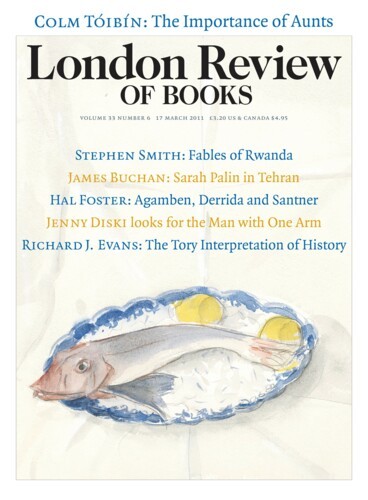Worried about careless thinking in all the euphoria yesterday at the shuddering on his plinth of Rupert Murdoch, the undersung Labour MP Graham Allen underlined the problem of volume of ownership, calling for 'a proper legal framework, as well as clarity about how many news and media outlets that one person, or one organisation, can own. Until you resolve those questions in six months time we could be back in exactly the same position.' Murdoch already owns too many newspapers and too much of BSkyB. A law forbidding anyone, directly or through nominees, to hold more than a fixed, low percentage of any or all media would build a barrier against invincibility. Belief in Murdoch's invincibility produced Blair's speech of flatbelly abjection before News Corp employees at Hayman Island in 1995.
Edward Pearce
Edward Pearce is the author of Denis Healey and Reform! The Fight for the 1832 Reform Act.
Ed Miliband’s enemies in the Labour Party are indulging in luxury: a pointless, expensive thing that only people with four years to spend can afford. Up to a point, they resemble John Major’s enemies in the Tory Party – a chorus of Viv Nicholsons who spent, spent, spent down to the penury of 165 surviving MPs in 1997. Those Tories had a reason, if an absurd one. They were hung up on the EU as a conspiracy by the heirs of Hitler to abolish England. The other motive for hating Major was devotion (in the High Church sense) to Margaret Thatcher, Queen and Martyr.
The almost certain victory in the referendum of Conservative self-interest through financial overkill should not be the end of the matter. The retention of First Past the Post has been won by rich men spending deep, as they spent deep at the last election. Why should they be allowed to? Why should the party of the right go into every election with an advantage that wins it all but those to which it comes massively unpopular? The response is simple: a hard, low limit on what may be spent by private individuals and corporations in respect of all votes, electoral or consultative. Avoidance would be pre-empted by very heavy fines for all attempts to subscribe through nominees, individual or corporate. Preventing elections from being bought would make far more difference than changing the voting system.
'If Ed Miliband doesn't provide more direction for his party and more definition for himself,’ Mary Ann Sieghart writes in today’s Independent, ‘he is in danger of ending up like William Hague.' She doesn’t mean he’ll be foreign secretary one day; rather that he stands no chance of being prime minister unless he manages to ‘project a political personality that engages voters’ imagination’. ‘People want to know what type of person he is and what motivates him,’ she says. Newspaper columnists have been complaining about Miliband along these lines since before he was elected Labour leader. And they couldn’t be more wrong.
Interpretations of History
17 March 2011
Pieces about Edward Pearce in the LRB
Shoy-Hoys: The not-so-great Reform Act
Paul Foot, 6 May 2004
No one disputes that the British electoral system before 1832 was a mockery of representation. Members of Parliament did not want or pretend to be representative: the word ‘democracy’...
Labour’s Beachmaster: Jenkins, Healey, Crosland
Peter Clarke, 23 January 2003
The sudden death of Roy Jenkins took us all by surprise. He was over eighty, of course, and with a heart problem that had required major surgery. This latterly gave him a good excuse to sit down...
Up the avenue
Peter Clarke, 11 June 1992
Don’t be put off by the title, since it’s only a laboured allusion to Cobbett’s Rural Rides, lacking the alliterative euphony of the original. What Edward Pearce of the Guardian...
What difference did she make?
Eric Hobsbawm, 23 May 1991
The ‘question of leadership’ which is the subject of both these books is the question of how much difference leadership in politics can make. Contrary to what is held by believers in...
Read anywhere with the London Review of Books app, available now from the App Store for Apple devices, Google Play for Android devices and Amazon for your Kindle Fire.
Sign up to our newsletter
For highlights from the latest issue, our archive and the blog, as well as news, events and exclusive promotions.


